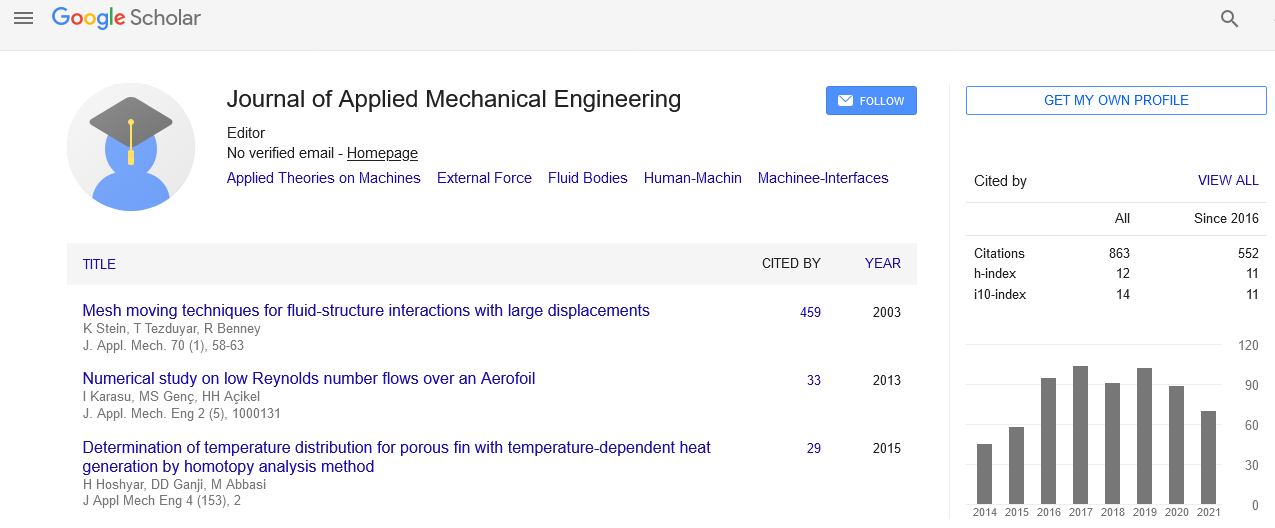Indexed In
- Genamics JournalSeek
- JournalTOCs
- CiteFactor
- RefSeek
- Hamdard University
- EBSCO A-Z
- OCLC- WorldCat
- Publons
- Google Scholar
Useful Links
Share This Page
Journal Flyer

Open Access Journals
- Agri and Aquaculture
- Biochemistry
- Bioinformatics & Systems Biology
- Business & Management
- Chemistry
- Clinical Sciences
- Engineering
- Food & Nutrition
- General Science
- Genetics & Molecular Biology
- Immunology & Microbiology
- Medical Sciences
- Neuroscience & Psychology
- Nursing & Health Care
- Pharmaceutical Sciences
Control / supervision design in the context of reconfigurable manufacturing systems
Joint Event on 2nd International Conference on Design and Production Engineering & International Conference on Mechatronics, Automation and Smart Materials
November 13-14, 2017 Paris, France
Pascal Berruet
Lab-STICC, France
Keynote: J Appl Mech Eng
Abstract:
The adaption of manufacturing companies to frequent market changes is essential for remaining competitive. In that way, Reconfigurable Manufacturing Systems are interesting as they offer the opportunity to choose the organization of their elements very late in the conception and to modify it dynamically or not during exploitation. This results extensions of control to control/command that includes monitoring, supervision and several control versions. As a consequence of the growing complexity, managing the overall design process, the costs and the delays have become very challenging. One challenge is to easily get several controls depending on exploitation modes, on the PLC targets and consistent with the HMI supervision in order to efficiently pilot the systems. The designer has also to ensure that the control does not contain errors. To address these issues, some automatic generation flows have been proposed. They are based on two main principles: A component based approach that enables reusing and model driven engineering principles that provide a systematic way to derive high level models to platform dependent models such as control codes and as a result, different tools implement the presented flows. The first one Comgem generates control codes for several executing platforms. The code enables different levels of reconfigurations. The second one Anaxagore both generates control and HMI supervision interface that guarantees consistency. Each tool takes part of our demo platform named SCAP Industry of the Future. The provided solutions enable to better take the system expertise into account. The designers do no more focus on low level code constraints and can bring their skill at the level of the system. As computing and data is more and more present in manufacturing systems, future developments have to be carried on verification of the solutions that should incorporate some cyber security featuresRecent Publications 1. K Sacha (2010) Verification and implementation of software for dependable controllers. International Journal of Critical Computer-Based Systems 1(1-3):238‚??254. 2. A Bignon, A Rossi and P Berruet (2013) An integrated design flow for the joint generation of control and interfaces from a business model. Computers in Industry 64(6):634-649. 3. T Veps√§l√§inen and S Kuikka (2014) Model-driven development of automation and control applications: modeling and simulation of control sequences. Advances in Software Engineering doi:10.1155/2014/470201.
Biography :
Pascal Berruet is a Professor at Universite de Bretagne-Sud (University of South Brittany, France). He obtained his Engineering diploma in 1994 from Ecole Centrale de Lille (French 'Grande Ecole'), and a Master's degree in Automatic Control and Industrial Computer Sciences from Universite de Lille. He obtained his PhD from Universite de Lille in 1998, and his Habilitation in 2007 from Universite de Bretagne-Sud. From 2012 to 2014, he served as Vice President for Social and Economic Affairs. His researches are in the area of implementation, supervision and automatic control generation for discrete event reconfigurable systems. Through these activities, he contributes in collaborative and innovative projects for Energy Efficiency, Smart Home Automation, and Reconfigurable Manufacturing Systems. He is also involved in transfer platforms (SCAP Industry of the Future) and valorization projects.

